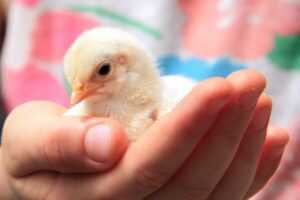Elementary Students to Learn From 4-H Embryology Project
go.ncsu.edu/readext?913914
en Español / em Português
El inglés es el idioma de control de esta página. En la medida en que haya algún conflicto entre la traducción al inglés y la traducción, el inglés prevalece.
Al hacer clic en el enlace de traducción se activa un servicio de traducción gratuito para convertir la página al español. Al igual que con cualquier traducción por Internet, la conversión no es sensible al contexto y puede que no traduzca el texto en su significado original. NC State Extension no garantiza la exactitud del texto traducido. Por favor, tenga en cuenta que algunas aplicaciones y/o servicios pueden no funcionar como se espera cuando se traducen.
Português
Inglês é o idioma de controle desta página. Na medida que haja algum conflito entre o texto original em Inglês e a tradução, o Inglês prevalece.
Ao clicar no link de tradução, um serviço gratuito de tradução será ativado para converter a página para o Português. Como em qualquer tradução pela internet, a conversão não é sensivel ao contexto e pode não ocorrer a tradução para o significado orginal. O serviço de Extensão da Carolina do Norte (NC State Extension) não garante a exatidão do texto traduzido. Por favor, observe que algumas funções ou serviços podem não funcionar como esperado após a tradução.
English
English is the controlling language of this page. To the extent there is any conflict between the English text and the translation, English controls.
Clicking on the translation link activates a free translation service to convert the page to Spanish. As with any Internet translation, the conversion is not context-sensitive and may not translate the text to its original meaning. NC State Extension does not guarantee the accuracy of the translated text. Please note that some applications and/or services may not function as expected when translated.
Collapse ▲ Excitement is building among second graders at four elementary schools in Cleveland County. Beginning Monday, March 6, they will spend three weeks incubating eggs and hatching chicks in their classrooms.
Excitement is building among second graders at four elementary schools in Cleveland County. Beginning Monday, March 6, they will spend three weeks incubating eggs and hatching chicks in their classrooms.
Coordinated by N.C. State Extension, the 4-H Embryology Classroom Project uses the experiential learning model to teach children to use an incubator, turn eggs, pick up and count chicks, and build and operate a brooder to keep the chicks warm. Students also learn skills in observing, comparing, measuring, and communicating by participating in the STEM curriculum. Classroom teachers will use a project guide and teaching tools to walk children through what is going on inside the egg as the embryo grows.
Project partner Case Farms is providing each classroom with 12 fertilized eggs, and the Cleveland County 4-H Program is supplying incubators and brooder supplies. Once hatched, the chicks will be raised by local farmers.
This round of the 4-H Embryology Classroom Project will reach students in 17 second grade classrooms at Boiling Springs, Jefferson, Springmore, and Washington Elementary Schools.




